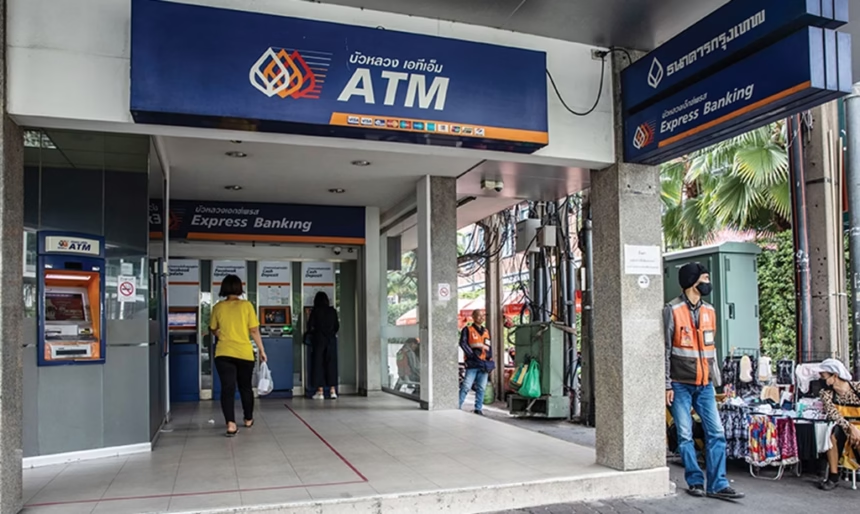BANGKOK – Thais now live in a time where global hacking gangs treat bank accounts like open hunting grounds. From Europe to Asia, attacks on banks and payment systems have surged, and Thailand is not spared. Criminals use fake apps, spoofed websites, and call-centre scripts to trick people out of their savings.
In response, Thai banks are tightening their digital defences. Rising online scams, account takeovers, and fake banking apps have pushed security to the top of the agenda. Banks are now rolling out stricter identity checks, one person one device rules, AI fraud monitoring, and are working under new Thai laws with telecoms and police.
This article explains what has changed in 2025, what it means for customers, and how people in Thailand can stay safer when using mobile banking.
Why Thai Banks Are Fortifying Against Global Hack Waves in 2025
Across the world, cyber attacks in 2025 have jumped sharply. Security analysts report that attacks almost doubled in early 2025 compared with the year before, and large firms have suffered huge data thefts and ransom incidents. Thai experts warn that Asia is now one of the hottest zones for cyber threats, and banks are prime targets.
Thailand has seen a flood of:
- Fake investment sites promising unreal returns
- Phishing links sent through SMS, Line, and social media
- Call-centre gangs posing as police or bank staff
These schemes hit everyone, from major banks handling cross-border transfers to everyday customers with small balances. The speed of digital payments and the wide use of banking apps give scammers a fast rail for stolen money.
Regulators and banks now treat cyber risk as a top business issue, not a niche IT problem. The Bank of Thailand and government agencies have branded 2025 a cybersecurity year, with a clear message: if the financial system is not safe, trust in the whole economy is at risk.
From street scams to cyber gangs: how the threat has shifted
In the past, most fraud had a physical face. Criminals forged documents, tampered with cheques, or used fake IDs at branches. That kind of fraud moved slowly and often left a trail.
Today, the battlefield sits on smartphones. Cyber gangs steal personal data, passwords, and one-time codes, then drain accounts in minutes. Common tricks now include:
- Fake SMS that appear to come from a bank, with links to malicious sites
- Spoofed websites that copy bank login pages almost perfectly
- Social media investment scams that lure victims into sending funds to mule accounts
A person might think they are updating an app or confirming a payment. In truth, they are handing control to a stranger. This sharp shift has forced Thai banks to redesign security from the ground up, with far more focus on identity and device control.
Why Thailand is a key target for global hacking networks
Thailand offers rich rewards for cyber gangs. Smartphone use is high, mobile banking is popular, and many users are new to digital finance. At the same time, a large share of people use low-cost phones, public Wi-Fi, and delayed app updates.
These habits leave cracks that hackers can exploit. Once criminals gain access, they move funds through layers of money mule accounts, making the trail harder to follow. As analysts explain in pieces such as why cybersecurity banking is critical for Thai banks, this mix of high usage and patchy security makes the sector a prime target.
The cost of cyber attacks for banks and everyday customers
Cyber attacks hurt on several fronts:
- Direct losses when money is stolen or must be refunded
- Frozen accounts while investigations take place
- Stolen identities are used to open new accounts or loans
- Loss of trust in mobile banking and digital payments
Banks also face heavier operating costs to upgrade systems and hire specialist staff, along with possible penalties if they move too slowly. In recent months, some institutions have had to lock large numbers of accounts after scam alerts, similar to the wave described in reports on Thailand banks locking online sellers’ accounts.
For customers, stronger controls can feel strict or inconvenient. Extra checks at login or during transfers take time. Over the long run, however, these measures reduce the chance of global hackers walking off with life savings.
New Security Rules: How Thai Banks Are Locking Down Mobile Banking
In 2025, Thai banks will have rolled out a package of security measures that fit together like layers of a safe. The focus is on mobile banking, where most scams now hit.
Key changes include:
- Stricter identity checks and deadlines to re-verify users
- A one-person one-device rule for banking apps
- Stronger checks for large transfers and daily limits
- Risk-based controls for minors and vulnerable users
These rules add steps to some tasks, but they sharply raise the bar for cyber gangs.
Stricter identity checks and deadlines for mobile banking users
From February 2025, banks started a nationwide clean-up of mobile banking records. Millions of customers received in-app prompts to confirm their identity by set dates. Those who ignored the warnings risked suspension of mobile services.
Re-verification usually involves:
- Scanning a Thai ID card or passport in the app
- Taking a selfie that matches the document photo
- Confirming mobile number and basic personal details
The aim is clear. Banks want to close fake, incomplete, or dormant accounts that criminals can use as stepping stones. By sending data on mismatched records to agencies such as AMLO and the NBTC, banks and telecoms can cross-check who really owns each number.
The 1 person 1 device rule: shutting out account takeovers
The Bank of Thailand has pushed a one person one-person-one-device policy for mobile banking. In simple terms, each customer can link only one mobile device to their main banking app profile at a time.
This rule makes password theft far less useful to criminals. Even if a scammer tricks someone into handing over a PIN, they cannot just add a new phone and empty the account. To change the registered device, the user must pass extra checks in the app or visit a branch.
Customers may find device changes a bit slower, yet they gain a stronger lock on their account. It is like having a house key that only works in one door, on one house, not in every lock on the street.
Stronger checks for large transfers and daily limits
Banks have also tightened controls for large transfers. For example, many mobile apps now trigger extra checks if:
- A single transfer is over 50,000 baht
- Total transfers exceed 200,000 baht in one day
For such payments, users may have to confirm with a fingerprint, face scan, or a one-time passcode. Some banks also ask users to confirm high-risk transfers through separate channels.
Risk-based limits now apply. Minors may have daily caps of around 50,000 baht. Customers flagged as high risk, or with thin records, can face lower limits until their profile is clearer. This slows down big scam losses while allowing normal small payments to flow.
Protecting minors and vulnerable users with risk-based controls
Thai banks are starting to shape security around different groups. Minors, elderly customers, and first-time app users often face tighter controls. These can include:
- Lower daily limits for transfers and payments
- More frequent alerts and pop-up warnings
- Reduced access to risky features, such as instant transfers to new payees
The goal is safety, not blame. By guiding those most at risk, banks cut the chances that a single scam wipes out a family’s savings.
How Thai Banks Use AI and New Tech to Detect Hackers in Real Time
Behind the scenes, banks now run powerful AI tools that watch transactions and login patterns at scale. These systems look for signs of hacking or scams in real time.
Cyber experts expect AI-based attacks and defences to define 2025 cybersecurity trends. Thai banks are on that path, supported by new laws that back AI fraud detection and faster blocking of malicious websites.
AI fraud engines are watching millions of transactions at once
AI fraud engines scan millions of transactions across many accounts at the same time. They search for patterns that look wrong, such as:
- Sudden large transfers to new accounts overseas
- Dozens of small payments to online games from a pensioner’s account
- Logins from two distant countries within minutes
When the AI spots a red flag, it can freeze or delay the transaction and alert human staff. Teams then contact the customer or block the payment entirely. This mix of AI speed and human judgment helps banks stay ahead of fast-moving hack waves.
Device-bound passkeys and continuous checks behind the scenes
Thai banks are also turning to stronger forms of login. Device-bound passkeys store a secret key on a trusted phone or device instead of using a simple password.
If a scammer steals a password, they cannot use it on another device because the secret key never leaves the customer’s phone. This sharply reduces the impact of phishing.
On top of that, continuous authentication runs quite checks during each session. The system keeps an eye on device ID, network behaviour, and other signals. If the pattern suddenly looks risky, the app may log the user out or ask them to sign in again. For the customer, it feels like a normal session. For the hacker, the door keeps slamming shut.
New AI rules from the Bank of Thailand to keep systems fair and safe
The Bank of Thailand has released AI risk management guidelines that apply across the sector. Banks must:
- Test AI models for errors and weak spots
- Monitor for unfair bias in areas like lending
- Keep humans in charge of major decisions, such as large fraud cases or loan approvals
Stronger AI does not mean machines control everything. Banks still carry legal and moral responsibility for outcomes, and regulators are clear that safety and fairness come first.
Law, Telecoms, and Taskforces: The New Cyber Defence Network
Technology alone cannot stop global hack waves. Thailand has now built a broader defence network that links banks, telecoms, regulators, and police.
A key step is the Emergency Decree on Measures for the Prevention and Suppression of Technology Crimes (No. 2), which took effect in April 2025. It gives authorities more power to move quickly and demands faster cooperation from private firms.
New emergency decree: shared responsibility for cybercrime
Under the new decree, banks must act fast when they see suspicious activity. They are required to:
- Report suspected scam cases without delay
- Freeze accounts linked to scams when there is solid evidence
- Work with other banks when funds hop between institutions
Telecoms must help block scam calls and SMS campaigns. Online platforms are pushed to remove fake ads and scam pages more quickly. This shared model reflects the reality that digital crime jumps across systems and borders in seconds.
Working with telecoms and regulators to cut off scam networks
Thai banks now share intelligence with telecom operators, the NBTC, and the police. Joint actions include:
- Mass blocking of known scam URLs and fake banking sites
- Faster suspension of SIM cards used in fraud
- Closer watch on high-risk payment channels and mule account networks
Customers may notice more warning SMS or in-app alerts about active scams, echoing the wider push seen in reports on police action against online scam accounts in Thailand. These warnings are designed to reach people before the criminals do.
Preparing security rules for Thailand’s coming virtual banks
Thailand plans to allow virtual banks, or digital-only banks, to launch around 2026. Regulators have made clear that these new players must build strong security from day one.
Rules cover cyber governance, backup systems, fraud response plans, and customer support during incidents. Whether a bank runs from branches or only from apps, the duty is the same: protect money and data, and react quickly when something goes wrong.
What Bank Customers Should Do Now to Stay Safe From Hack Waves
Thai banks can raise the walls, but customers still hold the keys to their own accounts. Simple habits make a big difference.
People should treat in-app prompts and official notices from their bank as important, not as background noise. At the same time, they must treat unknown links and surprise calls with deep suspicion.
Cooperating with banks on new checks and security alerts
When a bank app asks for identity re-checks, customers should:
- Confirm the request appears inside the official app, not via a random link
- Follow the steps calmly, using a stable internet connection
- Contact the bank through official hotlines or branches if unsure
Users should also keep phone numbers and email addresses up to date so alerts reach them quickly. Reading security messages instead of tapping past them can stop a scam in its tracks.
Locking down phones, passwords, and everyday habits
Good phone hygiene now matters as much as a strong front door. Customers should:
- Use a strong PIN or biometric lock on their phone
- Keep bank apps and phone software updated
- Avoid mobile banking on public Wi-Fi
- Never save one-time passwords in chat apps or screenshots
- Log out after using banking apps on shared devices
These habits support rules like one person one device and passkeys, turning a phone into a safer personal safe rather than a loose wallet.
What to do if something looks wrong in an account
If a customer spots a strange transaction or suspects a hack, speed is essential. The basic steps are:
- Contact the bank at once using official numbers or in-app chat.
- Use app features to freeze cards or accounts if available.
- Report suspicious transfers and follow the bank’s instructions.
- File a police report if advised, and keep all records and messages.
Fast reporting gives banks and telecoms a real chance to block further moves by scammers. People should never trust strangers who contact them first and claim to be from the bank or police, especially if they pressure them to act at once.
Conclusion: Shared Defence Against Global Hack Waves
Global hack waves are now a constant pressure on every financial system, and Thailand in 2025 is responding with tougher, smarter controls. Stricter identity checks, one person one device rules, AI fraud engines, new emergency laws, and closer work with telecoms and regulators all point in the same direction: stronger protection for customer money.
Security is now a shared task. Banks must guard systems and react fast, the state must set clear rules and pursue gangs, and customers must play their part with safer habits. As criminals refine their methods, Thai banks will keep upgrading their defences. Those who stay alert, follow bank guidance, and treat security steps as allies rather than obstacles can still bank with confidence in a dangerous online world.














